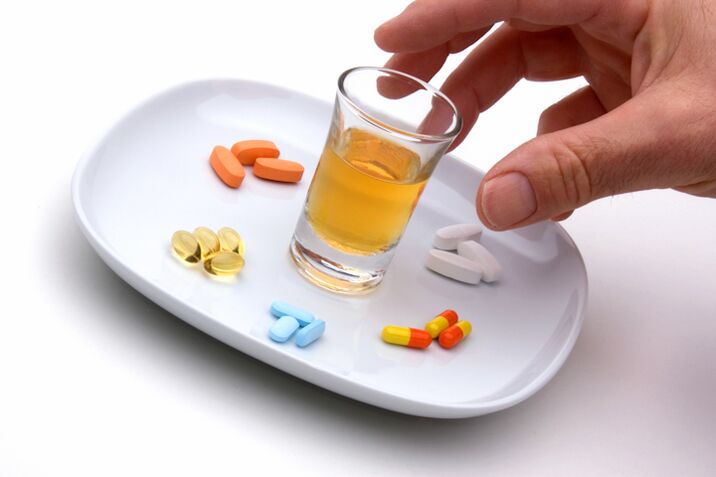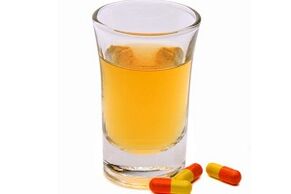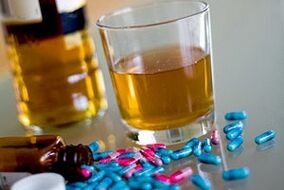Despite the existence of a large number of contraindications and a wide range of side effects, antibiotics are still a very necessary drug that has saved more than one life. Because only antibiotics can destroy the bacteria that cause dangerous diseases in the body.

In the days before the invention of these drugs, many people died of bacterial infections. Due to the lack of such drugs, many diseases are considered incurable.
Antibiotics cannot be taken without a doctor’s prescription. It is very important to follow the rules. In addition, you need to know that antibiotics are incompatible with alcohol. The answers to all questions related to taking antibiotics are included in this article.
Antibiotic rules
The most important rule of taking antibiotics is to use them only when antibiotics are not available. The indication for use is a symptom of an acute bacterial infection that the body cannot cope with on its own. In order to obtain the desired therapeutic effect, antibiotics should not be taken randomly.
You must follow the instructions below:
- Without medical education, you cannot prescribe antibiotics yourself. Only a doctor can determine the cause of the disease-virus or bacteria. For viral infections, antibiotics will not help; on the contrary, they will aggravate the course of the disease;
- If you feel better, you cannot stop the prescribed course of treatment. The disease may recur;
- Do not change the dose of antibiotics during treatment. The decrease in the dose may cause bacteria to develop resistance to the drug, while the increase in the dose is full of side effects or overdose;
- Antibiotics should not be drunk with tea, fruit juice, especially milk, otherwise taking medicine is useless. Milk, dairy products, and fermented dairy products are incompatible with antibiotics, and they reduce the effects of drugs. You can only drink the drug with water, about 0. 5-1 cup;
- You cannot take antibiotics at any convenient time. It is very important to follow the medication instructions and use the medication as described, ie before, during, or after meals. In addition, it is important to observe the frequency of administration (once in 24 hours, twice in 12 hours, 3 times in 8 hours, etc. ) to produce the required antibiotic concentration in the body;
- Do not combine antibiotics with physical activity;
- You cannot drink alcohol during the entire course of taking antibiotics.

Before prescribing antibiotics, the doctor must be informed of the following:
- Drugs currently being taken;
- Pregnancy or breastfeeding;
- Kidney or liver disease;
- diabetes.
And if observed earlier:
- Occurrence of side effects;
- The development of allergic reactions;
- Recently used antibacterial drugs.
When can I drink alcohol after completing the course of antibiotics?
Different antibiotics have different active ingredients. Therefore, each drug has its own conditions for elimination from the body. In one case, this is a short period of time and you can drink the next day. In the other case, you need to stop drinking for 7 days.
The necessary information is usually indicated by the manufacturer in the notes of the formulation. If not, it is best to wait 10 days. In addition, if the patient has kidney or liver problems, this period of time must be at least doubled.
How long can I drink antibiotics after drinking?
Alcohol is completely excreted from the body 21 hours after the last ingestion. After this period, you can take the prescribed antibiotics. However, in any case, if you are attending a course, it is best to reduce your alcohol consumption as much as possible.
Reasons for the incompatibility of alcohol and antibiotics
In addition to taking antibiotics to cause a significant burden on the kidneys and liver, taking it with alcohol will only aggravate this situation, because ethanol will slow down the work of the excretory system, so there is another important reason for incompatibility.
All the substances that enter the human body begin to decompose until only the original part remains. This can happen with alcohol and antibiotics. The danger of co-administration is that antibiotic molecules are similar to alcohol molecules. The body cannot recognize it correctly, which leads to failure.
Alcohol is treated as a drug by the body, which prevents the body from properly processing alcohol molecules.
Consequences of not following the rules of taking antibiotics
If the rules for taking antibiotics are violated, and the wrong choice of drugs or incorrect treatment plan, unnecessary side effects often occur.
These include:
- Flora disorders. It is caused by an imbalance between the health of the body and the pathogenic flora. This imbalance occurs at the moment when the number of pathogenic bacteria begins to exceed the bacteria that perform the body's protective function. The dysbacteriosis manifests as candidiasis or recurrent diarrhea.
- Allergic reaction. The individual's intolerance to the ingredients of the drug plays an important role here. Allergic reactions are different, including irreversible.
- Antibiotic resistance of bacteria. Pathogenic microorganisms can adapt to the active substances of antibiotics, only need to loosen the "grip". They continue to reproduce, and the disease continues accordingly.
Only by taking antibiotics seriously can the desired therapeutic effect be achieved.
Which antibiotics should not be taken with alcoholic beverages?
Some antibiotics are strictly forbidden to drink at the same time with alcoholic beverages. This information must be specified in the notes of the medicine. In addition, the doctor responsible for prescribing antibiotics must warn the patient about this.
These drugs include the following antibiotics:
- Tetracycline group. Preparations based on them are commonly used in medicine and have a wide range of effects;
- Chloramphenicol group. This group of drugs often produces side effects, and the combined use of alcohol will increase the toxic effects of the drugs;
- Lincoamide group. When taken with alcoholic beverages, it will have a negative impact on the liver and central nervous system;
- Aminoglycosides. This group of drugs is one of the strongest drugs in antibiotics. Poor compatibility with other drugs, let alone alcohol
- Cephalosporin group. Combined ingestion with alcohol can cause symptoms of severe body poisoning, which can lead to serious deterioration of health;
- Macrolide group. The combination of alcohol and antibiotics has a strong toxic effect on the liver and brain;
- Antibiotics used to treat tuberculosis;
- Antibiotic used to treat leprosy.

Also in the pharmacology market, the notes of some drugs do not contain information about the interaction with alcohol.
The lack of information about the combination with alcohol does not mean that the combination is allowed. There is no need to expose the body to unnecessary risks.
Possible consequences of combining antibiotics and alcohol
There is no way to know in advance how a particular organism will respond to the simultaneous intake of alcoholic fluids and antibiotics. Injury can be caused to any part of the body.
However, the most common consequences are:
- Severe allergic reaction;
- Severe and unbearable headache;
- dizziness;
- Difficulty breathing
- Chest pain, oppressive character;
- A sharp rise or fall in blood pressure;
- Dizzy;
- Excessive sweating;
- Nausea or vomiting;
- Liver damage;
- Aggravated state of drunkenness and hangover;
- Need to repeat the course of antibiotics. Alcohol can reduce or destroy the effects of drugs.
The consequences may be more tragic, depending on the individual and his health. Negative consequences are always all or part of the suffering of the organism. By simply eliminating alcohol and antibiotics, negative effects can be easily avoided.
It is important to know that at present, through clinical studies, only some antibiotics have been shown to be incompatible with alcohol. The rest of the drugs are still in doubt or not fully understood.
One must understand the possible consequences and focus on the drugs that have been studied that are incompatible with ethanol. Responsibility for your health should take precedence over any living environment related to drinking.
In order to get the best therapeutic effect, it is necessary to quit any alcohol, even the weakest alcohol.
























